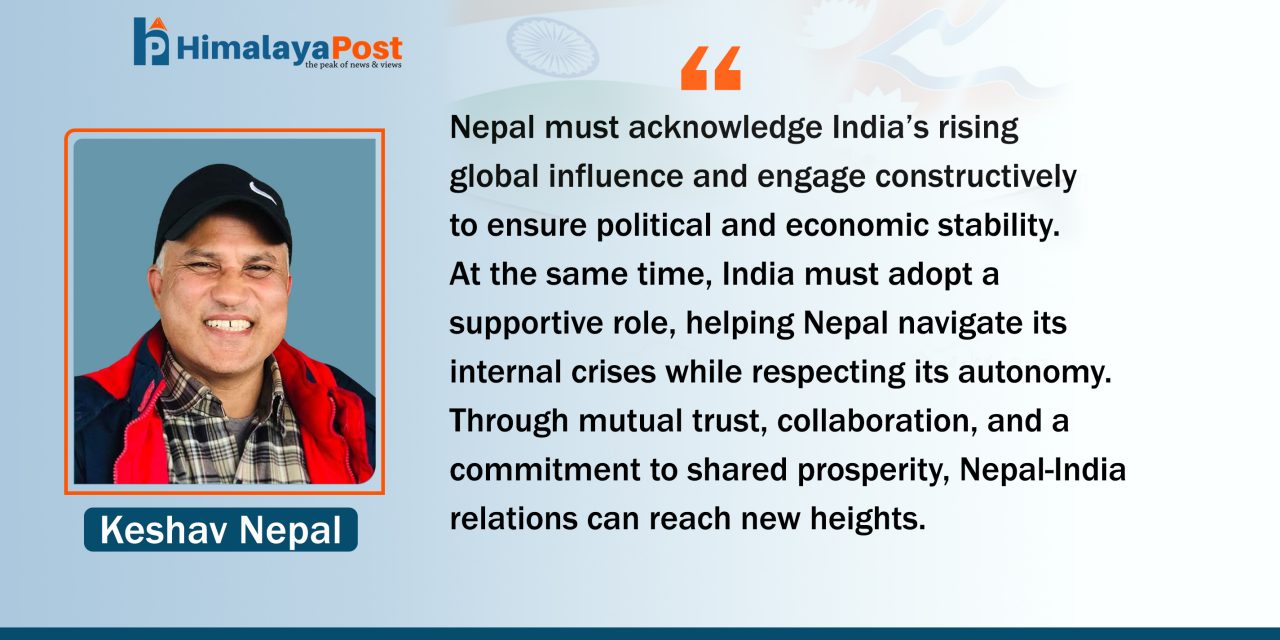– Keshav Nepal
A positive narrative toward India can be instrumental in strengthening Nepal-India relations in the evolving geopolitical and economic context. By fostering goodwill, mutual respect, and constructive dialogue, such a narrative helps build trust, paving the way for deeper cooperation in trade, infrastructure, energy, tourism, and cultural exchanges. Given the shifting global and regional dynamics, nurturing a strong and amicable relationship between the two neighbors is not just desirable but essential for their mutual prosperity and stability.
Despite this, Nepal’s political elite—both from the ruling and opposition parties—have struggled to maintain a stable rapport with India. Repeated attempts by Nepali leaders to seek engagement with Indian counterparts have often been met with reluctance due to their inconsistent and, at times, antagonistic stance toward India. This underscores the importance of a positive approach, which fosters a conducive environment for meaningful dialogue and collaboration.
Deep-Rooted Historical, Cultural, and Economic Ties
Nepal and India share centuries-old historical, cultural, and economic ties that have endured various political changes. From religious pilgrimages to trade and commerce, the interconnectedness of the two nations remains strong. India has significantly contributed to Nepal’s economic development by investing in key sectors such as education, public health, hydropower, and transportation. Acknowledging this partnership and emphasizing its benefits can cultivate a sense of unity and trust, leading to further investment and bilateral projects.
Beyond economic ties, shared democratic values provide an opportunity for diplomatic alignment. As the world’s largest democracy, India can serve as an important partner in strengthening Nepal’s political institutions and governance structures. A diplomatic approach rooted in democratic principles, regional stability, and sustainable development can help counter external influences that seek to destabilize South Asia.
Addressing Shared Global Challenges
The world today faces pressing challenges such as climate change, energy security, and economic recovery. Nepal and India can better address these issues through coordinated efforts and regional cooperation. Nepal’s vast hydropower potential, for instance, presents a significant opportunity for energy collaboration. India’s growing energy demand can be met through Nepal’s hydropower projects, offering Nepal a steady revenue source while contributing to a greener future.
Additionally, enhancing trade and connectivity between Nepal and India is crucial. Cross-border infrastructure projects—including highways, rail networks, and digital connectivity—can facilitate economic integration, fostering business expansion and job creation. By prioritizing economic interdependence and regional integration, Nepal can harness India’s robust economy to drive its own sustainable growth.
India’s Rising Global Influence and Nepal’s Political Uncertainty
Under Prime Minister Narendra Modi’s leadership, India has gained global recognition as a strong negotiator and an emerging power. Its economic growth, strategic diplomacy, and increasing influence in global decision-making have positioned India as a key regional and global player. Nepal can leverage its close historical and geographical ties with India to secure economic, political, and strategic advantages in this evolving global order.
Meanwhile, Nepal grapples with persistent political instability and governance failures. The inability of political parties to fulfill public expectations, coupled with widespread corruption and mismanagement, has led to increasing public frustration. The exploitation of national resources for the benefit of a select few has resulted in mass disillusionment, with many Nepalese seeking opportunities abroad due to limited prospects at home.
The failure of Nepal’s political leadership has fueled discussions on alternative governance structures, including the potential revival of the monarchy as a stabilizing force. While some view the monarchy as a unifying institution, others advocate for democratic reforms to restore political credibility.
India’s Role as a Stabilizing Force
India, often referred to as Vishwaguru (teacher of the world), has the diplomatic experience and regional influence to assist Nepal in navigating this complex transition. A stable Nepal is in India’s strategic interest, as political unrest in Nepal could have spillover effects on India’s border regions. India’s engagement should, therefore, focus on promoting good governance, encouraging transparency, and supporting Nepal’s economic and political stability without compromising its sovereignty.
Conclusion: A Future Built on Cooperation and Trust
A positive narrative toward India is not just about strengthening diplomatic ties—it is about recognizing the deep interconnections between the two nations and utilizing them for mutual benefit. Nepal must acknowledge India’s rising global influence and engage constructively to ensure political and economic stability. At the same time, India must adopt a supportive role, helping Nepal navigate its internal crises while respecting its autonomy.
Through mutual trust, collaboration, and a commitment to shared prosperity, Nepal-India relations can reach new heights. By fostering a narrative that emphasizes cooperation rather than conflict, Nepal can secure long-term stability, while India can reinforce its role as a trusted regional partner.





